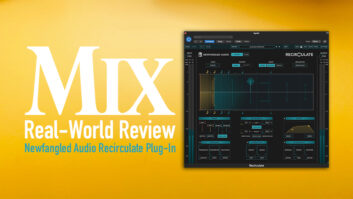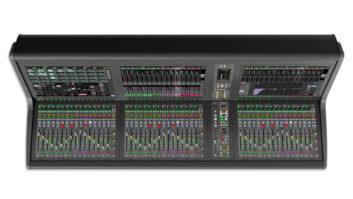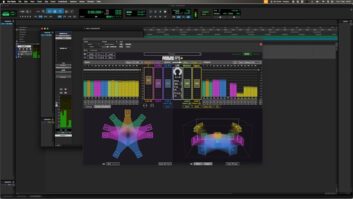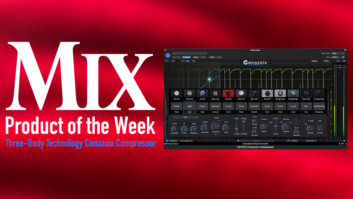HEART OF THE MATTER
This is regarding the Selected Credits in your May 2001 “MixMasters” interview with Armin Steiner. The album Dog andButterfly by Heart was engineered by Mike Flicker and Rick Keefer,and recorded and mixed at Sea-West Recording Studios in Seattle. Mikeand I certainly recorded 98% of this album.
I remember when Mike took one of the 2-inch reels to Los Angeles andrecorded a live string section on one of the songs at Capitol Studioswith Armin Steiner as string engineer.
I’ve been a fan of Armin’s work for many decades, but I want to makesure the record is straight on the credits. Mike and I are both veryproud of Dog and Butterfly.
Rick Asher Keefer
Sea-West Studios Hawaii
[email protected]
INTERNET AUDIO?
Paul Lehrman is right on about the problems we face with Internetmusic delivery. I would add that we should forget about music deliveryon the Internet completely and use it for the kind of low-bandwidthstuff for which it’s appropriate, like advertising or maybe musicteasers.
I’m appalled at the horrible excuse the audio industry has given usfor music on the Internet, particularly when artists must depend on itto introduce their work to listeners who have no basis for comparison,and who may end up thinking that the artist is bad because the art isheard through the lens of all that distortion and degradation.
A computer guru (and home recordist) I know was recently asked bySony Development about Internet music distribution, and in his frank,inimitable way, he told the executives that “[the most widelyused streaming audio format] is unacceptable for any purpose at anytime.” I agree. It’s okay for pull-string toys, but not for myart.
The first 100 years of the audio industry was distinguished by thepursuit of better audio — an attempt to re-create live musicalperformances accurately. The past dozen years or so have sadly beendominated by financial interests, and have seen a steady degradation ofa once-proud engineering march toward improvement.
Audio engineers now work for the bean counters and have beenstripped of their freedom to pursue audio quality. Never in the historyof the world has an industry capitulated so completely to a financialmodel. It seems to me, at least, like some surreal nightmare that themore fancy digital magic hits the market, the more unmitigated audioexcrement hits the consumer.
Of course, the obvious answer could be for people to go out and hearlive music, except for the sad fact that so much of it sucks even worsethan mono MP3. In short, music in general is suffering from badproducts, bad product literature, deceitful advertising and thecomplete abandonment of consumer education by audio manufacturers.
Education is expensive and returns little or no direct income. Musicclubs across America are filled with groups who carry abominations theycall “P.A. systems.” Musical instrument amplifiers arestill medieval torture devices that do more harm than good. Clubs thathire $10 soundmen get what they pay for. And while we’re at it, let’slay a massive helping of blame on the lack of music education in ourschools, thanks to the short-sighted politicians who think standardizedtests define preparation for the job market. You want fries withthat?
Drew Daniels
Via e-mail
BRING BACK JINGLES
It was only a very short time ago that any hot band or artist whoallowed their music to be used in a commercial was considered to be anartistic sellout. Today, commercials with recognizable popular songs(some of whose lyrics have no relevance to the commercial!) populate TVand films at a rate that is alarming to jingle companies and composerslooking to score the next BMW TV spot.
The major music companies, distracted by the likes of Napster,continue to protect and fortify their musical gold with better barbedwire. Faced with the fact that the big pot of money is now lots oflittle pots, the Big Guys have opened their vast catalogs to adagencies and film houses for licensing into ads and movies.
Licensing has historically been a painful, expensive andtime-consuming headache, with lawyers mucking up the process in theirwonderfully time-consuming way. Now, with the use of the Internet, theprocess is faster, simpler and cheaper for licensees.
Let’s add to the licensing pot every minor label and publisher withtheir hopeful artists and obscure tunes. Throw in online musicdistribution dot-coms and music brokers, stock music (needle-drop)companies, and stir vigorously. What we get is a lot more product thandemand. More music than there are commercials or productions.
What I see happening is a race for distribution at the expense ofmusical content, both creatively and in terms of audio quality, and inthe sheer weight of tons of tracks.
With commercials so much a part of today’s culture, why are they soeasily forgettable? I believe it’s because music and song lyrics arenow just an afterthought in the creation of spots. Back in the ’60s and’70s, hot lyricists and composers created music for memorable,award-winning national commercials, and then became stars and majormusic talent in their own right. Some examples are Paul Williams, BarryManilow and The Carpenters.
We’ve got to rejuvenate original commercial music. It is a commenton our creativity and our profession that so many spots are using tiredold standards. Have we lost the magic of solid lyrics and melody, andbeen covered up by a Wall of Sound Design? Have time, money and fear oftaking risk in our industry driven the great jingle singers to boringbut steady gigs in Vegas and Branson?
It’s time to re-introduce the most powerful form of commercial music— the Jingle — with multitracked vocals with tightharmonies backing up a really hot solo singer. Seven singers, a choir,the Peruvian High School Marching Band…I don’t care! Bring backthe spontaneity of live, human voices and don’t throw them into the ProTools blender when they’ve left the studio.
T.J. Knowles
Like Dat Music Inc.
www.likedat.com
Send Feedback to Mix [email protected].







